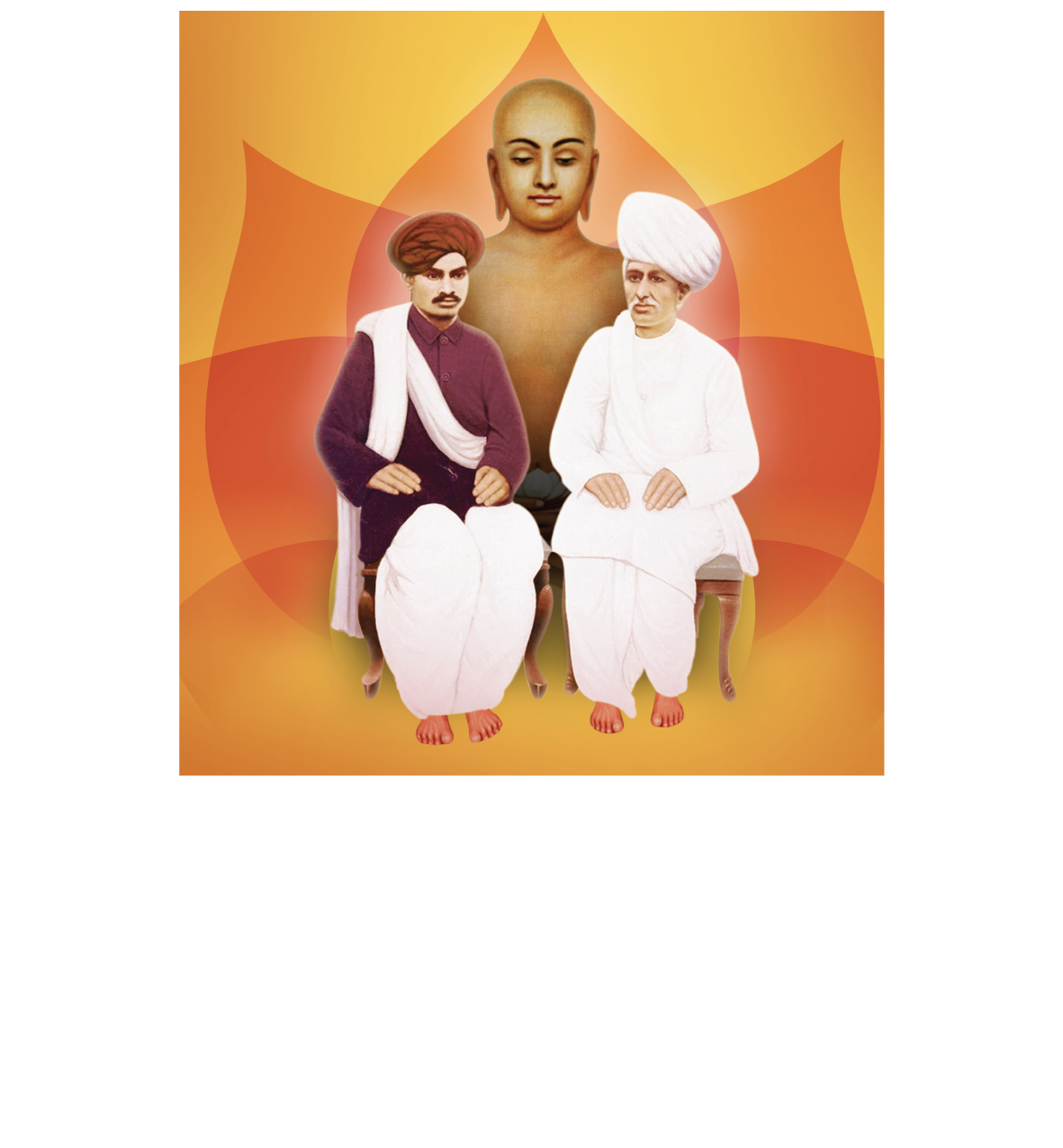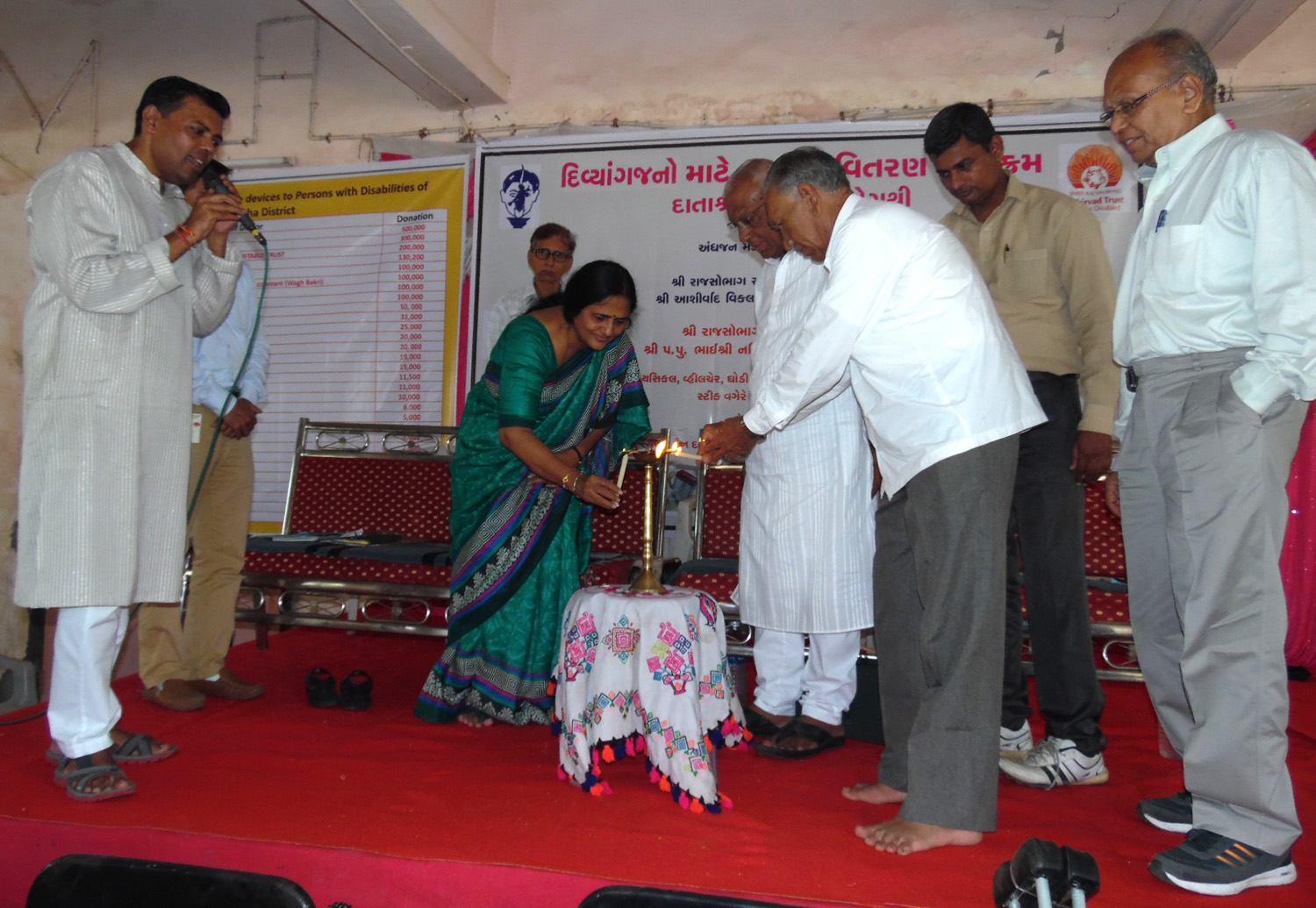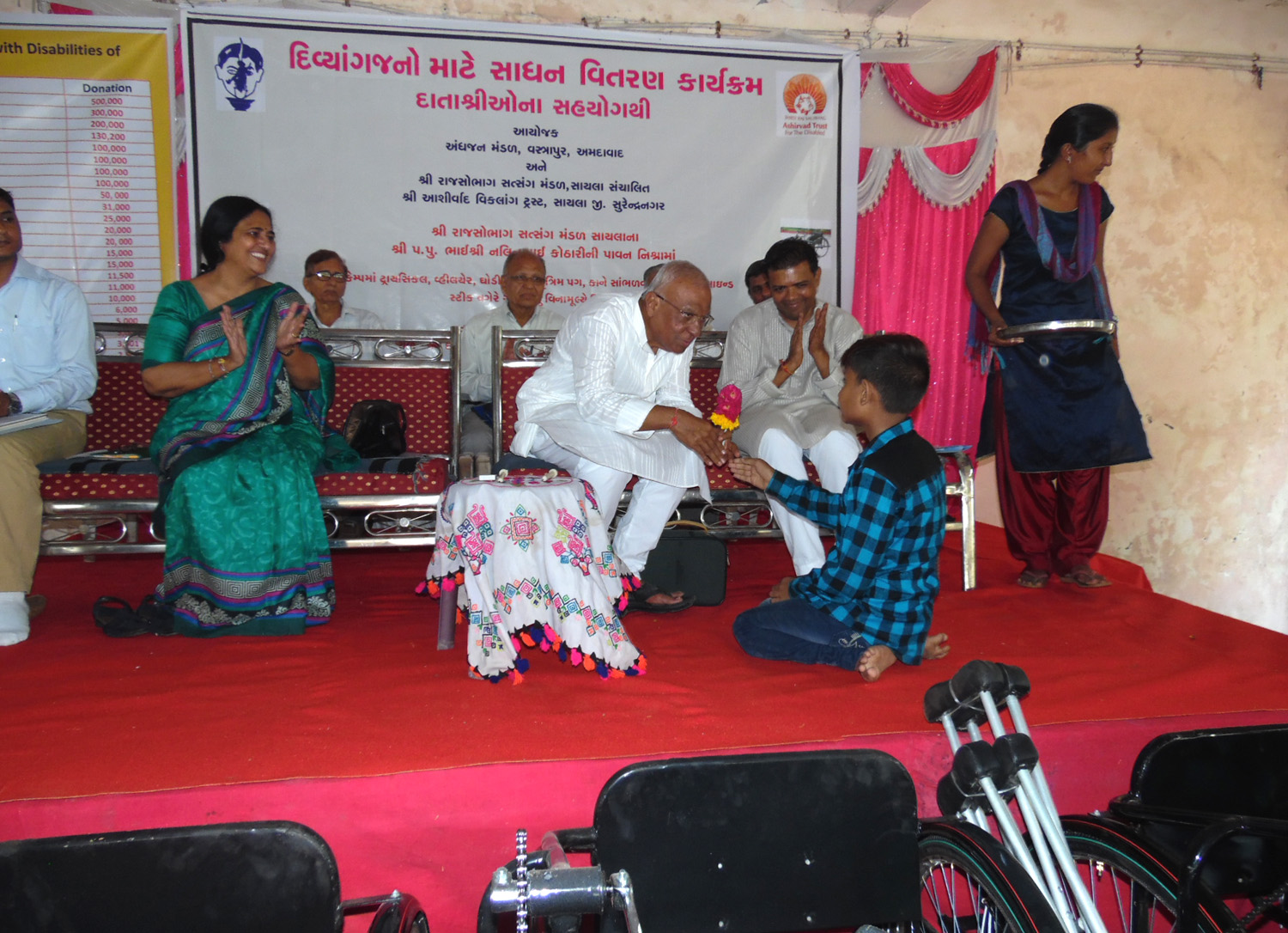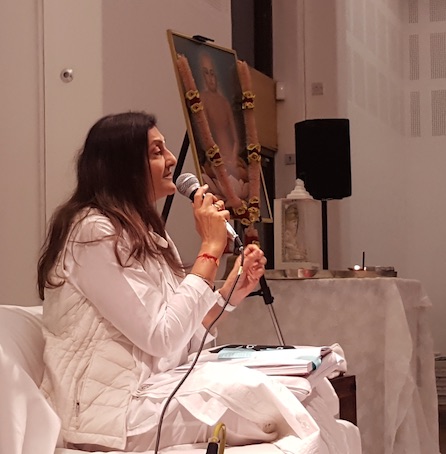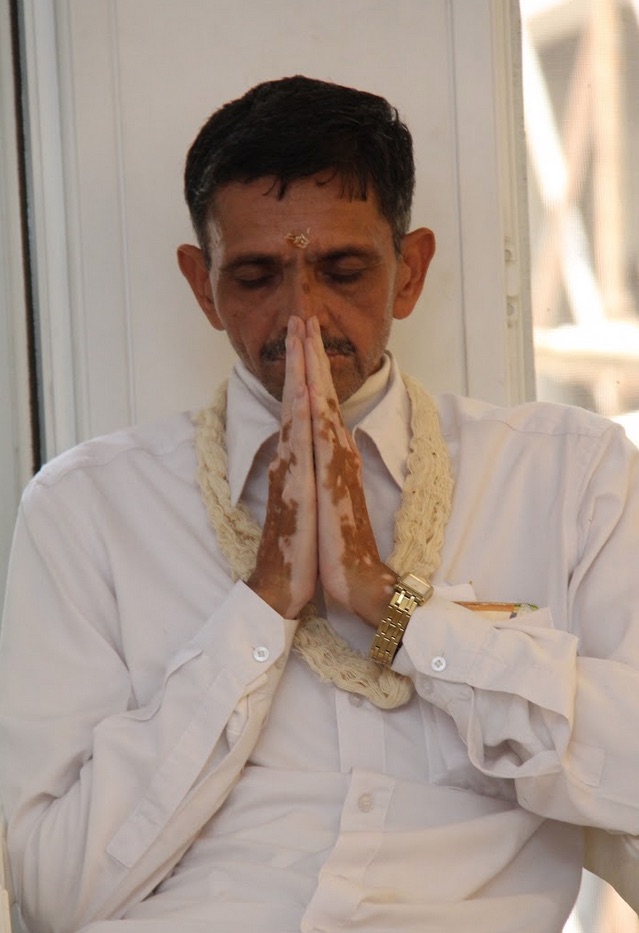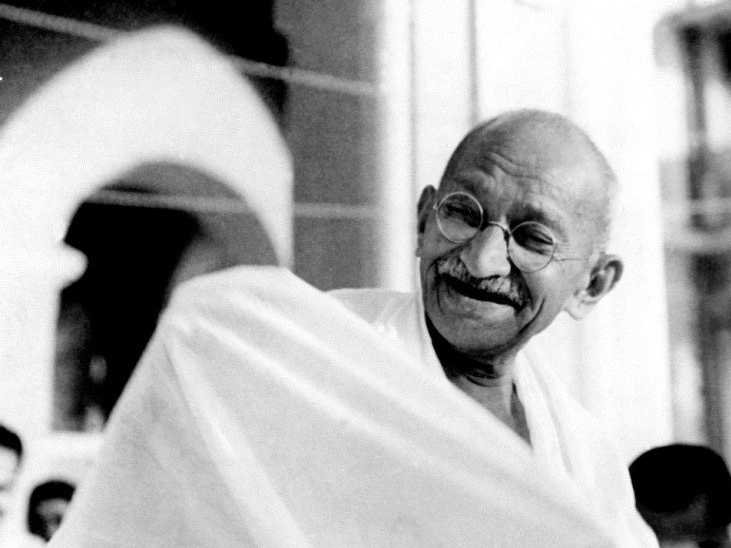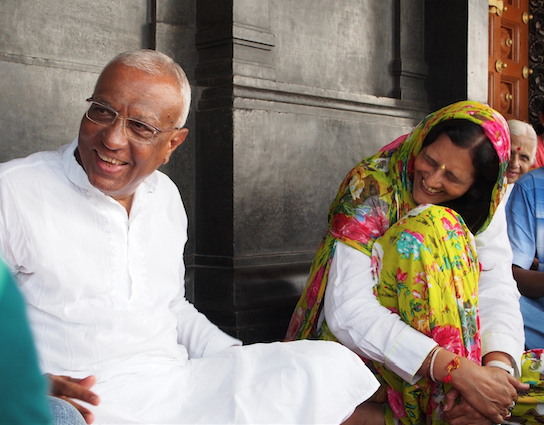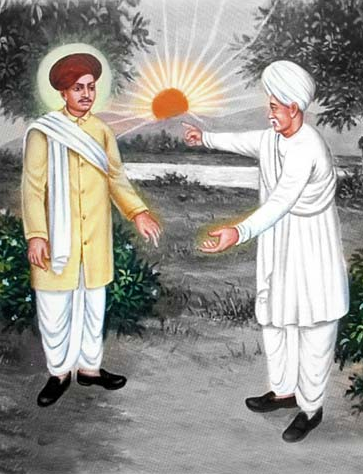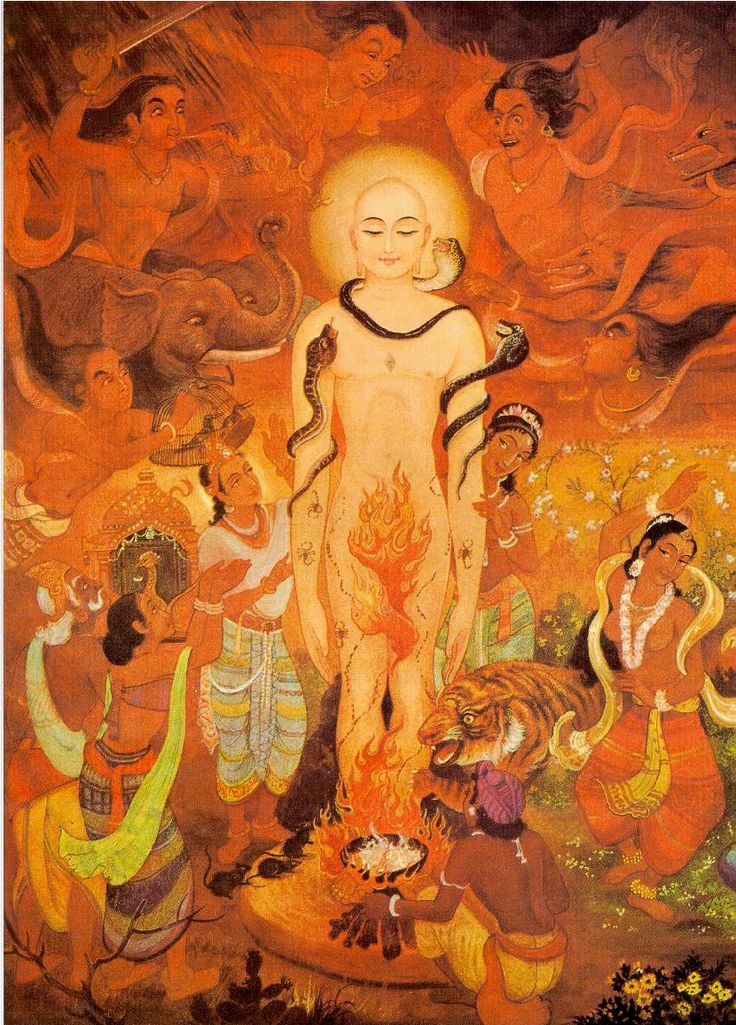“ચૌદ રાજલોકનું સ્વરૂપ વિચારવું તે દશમી લોકસ્વરૂપભાવના.
- શ્રીમદ્ રાજચંદ્ર, વચનામૃત.
Transliteration
Chaud raajloknu swaroop vicharvu te dashmi loksvaroopbhavana.
Translation:
To contemplate the nature of the universe is the tenth Loksvaroop bhavana.”
Loksvaroop Bhavana
Jainism has known for hundreds of centuries what modern science has now told us – that the universe is infinite, that there are galaxies we are yet to discover.
Science has extrapolated on the basis of information received from the Hubble and Kepler telescopes that there are a hundred billion galaxies in the observable universe. One such galaxy is the Milky Way. The Milky Way has at least 100 billion planets of varying sizes.
Our planet, Earth, with a 29 per cent land surface of 14,90,00,000 square km, isone among these planets, a dot in the vast span of the Milky Way.
And, each one of us is just one of the estimated seven billion human people living on Earth.
Referencing ourselves in the context of such a gigantic space can boggle the mind. So, let’s try this experiment: gaze at the sky. That dot where you look at the sky is infinite. Now imagine your place in the universe.
Contemplation of the grand universal expanse makes us realise how infinitesimalwe are in the larger scheme of things and how much smaller our sorrows and worries are in perspective.
Our self-created cocoon of desires and emotions, successes and failures, angsts and agonies which seem so real to us melt into nothingness when we place them in the intimidating largeness of the universe.
Such contemplation helps us grow out of our obsessive absorption with ourselves and also connect with what is truly real.
Like the fathomless universe, there is something even more incredible within us, something that is subtle and supremely powerful. Through the manifestation of this indomitable force called the soul, our Jain seers and Tirthankars saw and expounded the nature of the universe just as we know it today. Our soul too has latent divinity that can be unraveled by our sadhana – meditation, contemplation and conduct.
Jain scriptures narrate the nature of the universe in great detail. The universe is divided into Lok Akaash and Alok Akaash. Lok is the part of the gigantic universe that has life. It is spread in the shape of a man standing with both hands on his waist and legs stretched wide whereas Alok is the infinite space beyond Lok.
Lok, described as 14 Rajlok, comprises six elements (dravya): soul, matter, dharma (that facilitates mobility), adharma (that facilitates inertia), time and space. Lok is divided into Urdhvaloka - the heavenly areas, Madhyaloka where we live, and Adholoka or hell. At the apex is Siddha Sheela, the abode of liberated souls. That is the aspirational destination for all living beings, far away from the world of perpetual flux that we inhabit.
In Lok Akaash, living beings wander from one life to another without ever finding lasting peace and happiness. All living beings in Lok experience pain. Those living beings with five sensory organs (panchendriya) with or without a mind (sangni-asangni) crave to be free of pain. Unfortunately, real happiness eludes us because of ignorance and attachment that create bondage and tie us down to the vicious cycle of births and deaths in the universe. Only Siddha Sheela offers eternal bliss. Reaching there is possible through a series of steps, the most important one being self-realisation.
Just as fire burns impurities off gold, spiritual activities like meditation and penance shred the karmic load off our soul.
Reducing our lust for a material life, controlling our mind and being mindful of our goal at all times go a long way in speeding up this spiritual journey.
The path is long and tough for a person without discipline and determination. Even if a fan stops whirring in summer, we get restless. That’s why it’s all-important to watch our mind at all times. Param Pujya Bhaishree, who epitomizes total lack of desire, tells us to be calm observers of our desires and emotions in order to be able to overcome them.
Our meditation requires stillness of all the three guptis- body, speech and mind. Once we acquire such stillness, self-realisation is at hand. In his masterful composition, ‘Apoorva avsar,’ Param Krupaludev Shrimadji says material objects, place, time and emotions (dravya, kshetra, kaal and bhaav) cause impediments (pratibandh) in an unenlightened soul’s journey. A renounced soul, however, has none.
The journey to enlightenment begins with a simple question, “Who am I?” Shrimadji once asked his three-year-old daughter Kashi, “Who are you?” Kashi replied, “I am Kashi.” Shrimad told her, “No, you are a soul.” This understanding need to be internalized within. Our birth is an incalculably miniscule component of our existence over countless millennia. We do not remember it but we have made appearances in various parts of the universe including heaven and hell from the beginning of time. While our names and forms have changed with each birth, what has stayed constant through all births is our soul.
So, why not focus on the eternal and drop the ephemeral? Let’s drop the corporal shell from our minds and attach to the substratum of our being. Let’s be free of worries, fears and sorrows and endeavour to join the sublime consciousness of our Tirthankars at Siddha Sheela. What we know, let’s dwell upon. What we dwell upon, let’s experience. What we experience, let’s ensure it endures. Once on this trajectory, the Siddha Sheela is the limit for us.
લોકસ્વરૂપ ભાવના
કેવળજ્ઞાન અને કેવળદર્શનમાંથી પ્રગટ થયેલું વીતરાગનું વિજ્ઞાન એ બધી જ અપેક્ષાએ સંપૂર્ણ છે. વીતરાગ ભગવાનના જ્ઞાનમાં સર્વ પદાર્થો તેમજ તે પદાર્થોના ભૂત, વર્તમાન અને ભવિષ્યના તમામ પર્યાયો જણાય છે. જૈન ધર્મ અનાદિકાળથી ચાલ્યો આવે છે. શ્રી તીર્થંકર ભગવાને આ મહામૂલા ધર્મની પ્રરુપણા કરીને તેમાં લોકનું સ્વરૂપ સૂક્ષ્મ રીતે વર્ણવ્યું છે. વર્તમાનના વૈજ્ઞાનિકોએ હબ્બલ અને કેપ્લર ટેલિસ્કોપથી સંશોધન કરીને જાહેર કર્યું કે, આ બ્રહ્માંડ અનંત છે. જૈન ધર્મએ અનાદિ અનંત કાળથી આ વાસ્તવિકતાની ઘોષણા કરેલી છે. જૈન ધર્મના સિધ્ધાંતો અચળ છે અને માટે શાશ્વત છે. અસીમ એવા આકાશમાં કલ્પના ન કરી શકાય એવી વિરાટ દૂધ ગંગા ( milky way ) છે. અબજથી પણ વધારે તેમાં ગ્રહો રહ્યાં છે.
જે પૃથ્વી પર આપણે રહીએ છીએ તેમાં 29% જમીન છે જેનું માપ 14 90 00 000 કિલોમીટર છે. અબજ ગ્રહોમાં પૃથ્વી એક ગ્રહ છે. તે પૃથ્વી, માત્ર એક નાનું બિંદુ છે અને તે ટપકા જેવી પૃથ્વી ઉપર 7 અબજ મનુષ્યો રહે છે.
બ્રહ્માંડ કેવું વિશાળ છે તેની કલ્પના સુધ્ધાં આપણે કરી શકીએ એમ નથી. આ વિચારને મનમાં ધરી, જો આપણે અગાસીમાં જઈ, આભની વિશાળતાને નિહાળીએ તો તેની વિરાટતાનો કદાચ થોડો પણ લક્ષ આવે અને આપણે તેની સામે કેટલા વામણા છીએ તે પણ સમજાઈ જાય.
લોકાલોકની અનંતતાને હું ક્યાંથી સમજી શકવાનો? લોકનું સ્વરૂપ શ્રી તીર્થંકરે ભાખ્યું અને શાસ્ત્રોમાં તે જળવાયું તેથી કંઇક હું સમજી શક્યો છું. આખાએ લોકમાં અનંતવાર ભ્રમણ કર્યું છતાં તેનો હું વ્યવસ્થિત વિચાર કરી શકતો નથી. કોઈ પ્રજ્ઞાવંત પુરુષ સમજાવે તો તે સમજી શકાય.
આ વિચારધારા લાંબી ચાલે તો ખ્યાલ આવે કે આ સૃષ્ટિમાં મારું શું અસ્તિત્વ છે. ખરેખર મારું કોઈ વજૂદ નથી. મારું દુઃખ અને મારી ચિંતાઓ બધી કેટલી નાની છે. મારે મારા દુઃખ કે ભૌતિક સુખ તરફ કેન્દ્રિત થવાની કોઈ આવશ્યકતા નથી. ઈચ્છાઓ અને ભાવનાઓ, સફળતા અને નિષ્ફળતા, આનંદ અને પીડાઓનું કોઈ મહત્વ રહેતું નથી. નાહક હું દેહાભિમાન સાથે મારા જીવનનું પોટલું માથે લઇ ફર્યા કરું છું. હવે અહેસાસ થાય છે કે જે મારું નથી તેને મેં મારું માન્યું, અને અનંત કાળથી તેનું અભિમાન કરતો રહ્યો છું. સંસારમાં હું ડૂબેલો હતો પણ આવી જ્ઞાન સભર વિચારણા કરવાથી મારી મોહજનિત ભ્રામિક માન્યતાઓ ઉપર પ્રહાર થાય છે અને પરમ સત્ય તરફ હું કેન્દ્રિત થાઉં છું.
લોક અગાધ છે, અકલ્પનીય છે પણ એ ભૂલવાનું નથી કે દેહની અંદર વસેલા આત્માની શક્તિ અપાર છે. રાગ, દ્વેષ અને અજ્ઞાનને કારણે આ પ્રચંડ અને અનંત શક્તિ ધરાવતા આત્માની કિંમત આપણે એક કોડી જેટલી કરી નાંખી છે. તીર્થંકર ભગવાનનો આત્મા, ત્રણે કાળના લોકસ્વરૂપને હરહંમેશ સહજ જોઈ શકે છે. જે શક્તિ તીર્થંકરના આત્મામાં રહી છે તેવી જ શક્તિ આપણા આત્મામાં ધરબાયેલી પડી છે. સાધના, ધ્યાન, અનુપ્રેક્ષા અને નિર્મળ આચાર દ્વારા આપણી સુષુપ્ત શક્તિઓને જગાડવાની છે.
જૈન શાસ્ત્રો એમ કહે છે કે લોકાકાશ અને અલોકાકાશ મળીને સંપૂર્ણ લોક રચાયેલો છે. જે લોકાકાશ છે તે પુરુષ આકારે રહ્યો છે. એક પુરુષ પોતાના બે પગ પહોળા કરીને બન્ને હાથ કમર પર રાખીને ઉભો હોય એવો તેનો આકાર છે. સમસ્ત જીવ-રાશિ અહીં જીવે છે તેમજ અજીવ જડ પદાર્થો પણ લોકાકાશમાં જ રહ્યાં છે. લોકાકાશ વિશાળ હોવા છતાં તેના ક્ષેત્રની મર્યાદા છે, એક સીમા આવે છે જયાં એ પૂરો થઇ જાય છે અને અલોક આકાશની શરૂઆત થાય છે કે જે અસીમ છે, અમર્યાદિત છે. તે લોકાકાશના નીચેના ભાગમાં ભુવનપતિ, વ્યંતર અને સાત નરક છે. તીરછે અઢીદ્વીપ અને ઊંચે બાર દેવલોક, નવ ગ્રૈવેહક, પાંચ અનુત્તર વિમાન અને તે ઉપર અનંત સુખમય સિધ્ધશીલા છે.
અલોકાકાશમાં કોઈ પદાર્થ નથી, કેવળ અનંત આકાશથી તે બનેલો છે. જે લોકાકાશ છે તે 14 રાજલોક તરીકે પણ ઓળખાય છે. ઊર્ધ્વલોક, મધ્યલોક અને અધોલોક એમ તેના ત્રણ ભાગ છે. ઊર્ધ્વલોકમાં વિવિધ દેવલોક રહ્યા છે, મધ્યલોકમાં આપણે મનુષ્યો રહીએ છીએ અને અધોલોકમાં 7 નરક છે જેમાં અનંત દુઃખ રહ્યું છે. કર્મ ભોગવવાની આ એક અદ્દભૂત વ્યવસ્થા છે. કર્મ અનુસાર જીવ આ ત્રણે લોકમાં જન્મમરણ કર્યા કરે છે. લોકાકાશમાં રહેતા તમામ જીવાત્માઓ દુઃખી છે. સંસારના તાપથી ત્રાહિમામ છે. તે લોકાકાશ 6 દ્રવ્યોથી બનેલો છે. અનંત રૂપી પદાર્થો તેમાં રહેલા છે જે પુદ્દગલ તરીકે ઓળખાય છે. સ્વપરપ્રકાશક ચૈતન્ય શક્તિ ધરાવતા એવા અનંત આત્માઓ પણ તેમાં જીવી રહ્યા છે. જીવ અને પુદ્દગલને ગતિ અને સ્થિતિ કરવામાં જે સહાયક છે તે ધર્માસ્તિકાય અને અધર્માસ્તિકાયથી આખો લોક ભરેલો છે. પુદ્દગલ અને જીવાત્માઓને જે અવગાહના આપે છે તે છે આકાશ અને જે કંઈ સતત પર્યાયાન્તર પામી રહ્યું છે, બદલાઈ રહ્યું છે, તે જે સૂચવે છે તે છે કાળ.
આ લોકમાં રહેતા તમામ આત્માઓ સુખ શાંતિ અને સમાધિને ઈચ્છે છે પણ છતાંયે સતત દુઃખ, અશાંતિ અને અસમાધિમાં જ ટળવળી રહ્યાં છે. મોટા ભાગના જીવાત્માઓ સુખનો વિચાર સુધ્ધાં કરી શકતા નથી એવી એમની માનસિક પરિસ્થિતિ છે. જે સંજ્ઞી પંચેન્દ્રિય જીવાત્માઓ છે તેની પાસે વિકસિત મન હોવાને કારણે સુખ અને સમાધિ વિષે વિશેષ વિચાર કરવાની ક્ષમતા તેઓ ધરાવે છે પણ દેહમાં આત્મબુદ્ધિ કરી અમૂલ્ય જીવન વેડફી નાખે છે. પરપદાર્થો પ્રત્યેનું જોડાણ અને તાદાત્મ્ય બુધ્ધિ એવી છે કે તે જીવને કર્મબંધનું કારણ બને છે. સુખની દિશા અને ક્ષેત્ર હરહંમેશ તેને બહારમાં જ દેખાયાં છે. મૃગજળથી તૃષ્ણા છીપાવવા તે નિરર્થક પ્રયત્નો કરી રહ્યો છે. બહારમાં ભટકી રહ્યો છે. જન્મ અને મરણનું આ અતિ દુઃખદાયી ચક્ર તેનું ચાલતું જ રહ્યું છે. કોઈક વિરલા જીવો સતદેવ સતધર્મ અને સદગુરૂનો આશ્રય લઇ ઉત્તમ ધર્મનું આરાધન કરી સમસ્ત કર્મોથી મુક્ત બની સિદ્ધશિલા ઉપર અનંત સુખમાં સાદી અનંત કાળ માટે સ્થિર થાય છે.
મોક્ષનો માર્ગ વ્યવસ્થિત રીતે શાસ્ત્રોમાં વર્ણવાયો છે અને તેનો મર્મ સત્પુરુષના અંત:કરણમાં રહ્યો છે. મોક્ષના પગથિયામાં સહુથી મહત્વનું પગથિયું છે સમ્યગર્શન. આત્મસાક્ષાત્કાર થયા બાદ જીવનો સંસાર સીમિત થઇ જાય છે. અનંતાનુબંધી કર્મથી જીવ પોતાને બચાવી લે છે. સદગુરૂની આજ્ઞાનું અપૂર્વ રુચિથી પાલન કરી તે મોક્ષ સુધી પહોંચી જાય છે.
જેમ ખાણમાંથી નીકળેલું સોનું અશુધ્ધ હોય છે પણ અગ્નિના તાપથી તેમાં રહેલી અશુધ્ધિ દૂર થાય છે તેવી જ રીતે તપ અને ધ્યાનસાધના દ્વારા જીવ કર્મના આવરણને દૂર કરી પોતાના આત્માને નિરંજન બનાવી શકે છે.
ભૌતિક ઈચ્છાઓ, વિકાર અને વાસનાઓને સમજણપૂર્વક સંયમિત કરી, અંતર જાગૃતિ સાથે મોક્ષનું લક્ષ ભૂલ્યા વગર જયણાપૂર્વકનું જીવન જીવવાની આવશ્યકતા છે. જે અનંત કાળે નથી થઇ શક્યું એ આ ભવે થઇ શકે એમ છે.
માર્ગ લાંબો અને દુર્ગમ છે, પણ જેનો સંકલ્પ દ્રઢ છે, અનુશાસન તેમજ સંયમને જે પાળે છે તેના માટે માર્ગ સરળ અને સહજ બની જાય છે. ગરમી ખૂબ હોય અને ત્યારે પંખો ચાલતો બંધ થઇ જાય તો આપણે અકળાઈ જઈએ છીએ, માટે આપણાં માનસિક સંતુલન તેમજ બદલાતી વિચારધારાઓ અને ભાવો ઉપર ચોકી કરવી જરૂરી છે. શાંત સ્થિર અને પ્રસન્ન એવા પરમ પૂજ્ય ભાઈશ્રી કહે છે કે આપણે ધીરજ કેળવીને કોઈ પણ જાતની ઉતાવળ કર્યા વગર જીવનને જોતા રહેવું, તપાસતા રહેવું. મનમાં થતા ઘાત પ્રત્યાઘાતને સમજીને ધ્યાનપૂર્વક એક એક પગલું ભરવું કે જેમાં પોતાનું અને પરનું કલ્યાણ સમાયેલું હોય.
ધ્યાન કરીએ છીએ પણ મન ઝાલ્યું ઝલાતું નથી. તેને નિયંત્રિત કરવાની કોશીષ કરતાં તે વધુ બળવાખોર બનીને જગતમાં ભટકે છે. પણ એમ હારી કે થાકી જવાનું નથી. બળથી નહીં, કળથી કામ લેવાનું છે. તે મન પવિત્ર રહે એવું આયોજન પ્રથમ જરૂરી બને છે અને પછી તે પવિત્ર મન અવશ્ય સ્થિર થશે. મન, વચન અને કાયાને ગોપવી દેવાની છે. એવું જીવન જીવવાની કોશીષ કરવાની છે કે યોગ વધુમાં વધુ સ્થિર રહે. તેનો ઉપયોગ કેવળ ધર્મ આરાધના અર્થે થાય. લૌકિક જીવન જીવવામાં ઉત્સાહપૂર્વક ઉમંગ સાથે ન જોડાવું પણ ઉદયને સમભાવે ભોગવી લઇ શાંત રહેવું. એકવાર સ્થિરતા, ગંભીરતા અને ધીરજ કેળવાશે પછી આત્મજાગૃતિ અઘરી નથી.
અપૂર્વ અવસરમાં પરમ કૃપાળુદેવ શ્રીમદ્જી લખે છે કે દ્રવ્ય ક્ષેત્ર કાળ અને ભાવ એ પ્રતિબંધ છે, તે અસંગ થવા દેતાં નથી અને તેમાં અજ્ઞાની જીવ ઝકડાયેલો, બંધાયેલો રહે છે પણ સહજ સ્વરૂપી એવા જ્ઞાનીને તે કોઈ નડતાં નથી.
શ્રીમદ્જીએ પોતાની ત્રણ વર્ષની દીકરી કાશીને પૂછ્યું, “તું કોણ છે?” ત્યારે તુરંત દીકરીએ જવાબ આપતા કહ્યું કે “હું કાશી છું”. પછી શ્રીમદ્જીએ કાશીને સમજાવતાં કહ્યું કે “તું આત્મા છે” પણ માત્ર ત્રણ વર્ષની લઘુવયે પોતે આ દેહ છે અને તેનું નામ કાશી છે એ દ્રઢ થઇ ગયું હતું અને તેથી તે ફરી કહે છે, “હું તો કાશી છું”.
માર્ગની શરૂઆત સાધારણ પ્રશ્નોના અસાધારણ ઉત્તરથી થાય છે. તે પ્રશ્ન છે, “હું કોણ છું?” આ પ્રશ્ન ઉપર જેણે જેણે મનોમંથન કર્યું છે તેનામાં ઊંડી તાત્વિક વિચારણા જાગી છે અને તે પોતાને શોધવાના પ્રયત્નોમાં જોડાયો છે.
હું આત્મા છું - એ વિચાર અંતરમાં વિવિધ રીતે ઘુંટાવો જોઈએ. આત્મા અરૂપી છે અને છતાં બહુ સ્પષ્ટ છે કારણ કે તેના વગર બધું જ શૂન્ય છે. તેની શક્તિ થકી તો બધું ચાલે છે. તે નથી તો કશું નથી. તેના ગુણ લક્ષણોને જેમ વધુ વિચારીએ તેમ તેના અસ્તિત્વનો વધુ શ્રધ્ધાપૂર્વક સ્વીકાર થાય છે. ઇન્દ્રિયની પાછળ તે જ તો બધી જાણવાની ક્રિયા કરી રહ્યો છે. મન તેની જ શક્તિથી વિચાર કરી શકે છે. શરીરમાં તે રહ્યો છે ત્યાં સુધી જ એ શરીર સુંદર છે, હાલતું ચાલતું ખાતું પીતું છે. અનેક દેહ ધારણ કર્યા અને અનેક ગતિમાં જન્મ લીધો, કર્મને કારણે બહારનું બધું બદલાતું રહ્યું પણ અંદરમાં તે આત્મા એનો એ જ રહ્યો છે. આ જે અચળ અને સ્થિર છે તે જ હું છું. અક્ષય, શાશ્વત મારું સ્વરૂપ છે, બસ તેને અનુભવતા રહેવાનું છે. તેને ભૂલીને કોઈ કાર્ય કરવાનું નથી. જે બદલાતું છે તેને ભૂલી જઇએ અને જે સ્થિર છે તેને યાદ રાખીએ, આટલો પ્રયાસ આપણે કરવાનો છે.
દુઃખ, ચિંતા, ભય આ બધા ભાવોને ત્યાગી એક માત્ર પોતાના અજરામર સ્વરૂપની પ્રતીતિમાં જીવવાનું છે. મનની કલ્પનાઓ, વિચારોના વમળો બધાને ત્યાગી દેવાના છે. માર્ગ સરળ છે. એક આત્માને યાદ રાખી બાકી બધું ભૂલી જવાનું છે. સચ્ચિદાનંદનો જય-જયકાર કરતા રહેવાનું છે. આનંદ અને ધન્યતાને અનુભવી કૃતાર્થ થતા રહેવાનું છે.
જે જાણ્યું તેને અનુભવીએ, જે અનુભવીએ છીએ તેને માણતા રહીએ, જેને માણીએ છીએ તેમાં જ જીવન વ્યતિત કરતા રહીએ તો પછી સિદ્ધશિલા દૂર નથી, તે તો અહીં સદેહે અનુભવી શકાય છે! ૐ શાંતિ: શાંતિ: શાંતિ:
